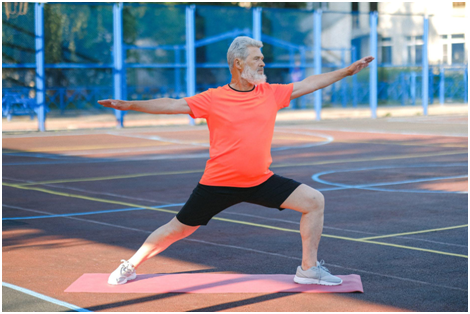7 Things You Can Do To Improve The Health And Wellness Of Your Parents
For many, parents are the guiding hands of the first part of our lives. They ensure we eat well, make visits to the doctor and dentist, and otherwise find a way to help us make the right choices for a satisfying life. However, as we age, so do they. And there comes a key moment, sometimes it’s a big incident or diagnosis, sometimes it’s a gradual change when we see our parents transform from superheroes to humans. Seeing a parent’s health decline or watching them fail in a minor way can be both alarming and frustrating. This can affect your relationship or add tension and anxiety to your mood and outlook.
Trying to keep up with the urgent needs of our parents and senior family members can become a daunting challenge. Dental check-ups, supplements, physicals – the list of seniors’ health needs continue. People who had healthy, safe habits when they were younger tend to become healthy seniors, but it’s never too late. Good health habits can make a significant difference even to elderly people who are vulnerable to disease or who have not made their health a priority in the past. Read on to learn some tips on how you can keep up with the health needs of your parents.
1. Eat Healthily
The digestion slows down as we age, rendering high-fiber fruits, vegetables, and whole grains as necessary as ever. Since the elderly are vulnerable to dehydration, they should drink plenty of water to remain energized and sharp. You should go shopping together and take the opportunity to point out nutritious foods and ingredients and find healthier alternatives to their favorite food and products. If you do something in the vegetable section, boost and pay attention to their chosen vegetables. Know your parents’ preferred salads and vegetarian meals and improve them by making dressings nutritious or by using healthier cooking techniques such as baking and steaming.
Breakfast is easy to keep nutritious. You can serve oatmeal and make a range of toppings, such as maple syrup, baked apples, brown sugar, jelly dollop, and fresh fruit. Creating a quick, full-bodied breakfast is a good way to start the day. You can also serve sliced fruit as an appetizer and make a simple soup for one meal per day. You can vary between purees and basic vegetable soups, you can add beans or not. You can also serve the soup with starch such as pasta, wheat, potatoes, or homemade bread. Having healthy food on your table during family visits can be touchy and challenging, but it’s a lot more likely to be a more enjoyable experience for both you and your parents.
2. Get Some Sleep
Regular waking and insomnia at night are usually among the elderly. As we age, we also experience natural shifts in sleep habits, such as becoming tired earlier, waking up earlier, or having a less deep sleep. However, disrupted sleep exhausted waking up every day, and other signs of insomnia are not part of natural aging. Sleep is just as critical for your physical and emotional wellbeing as it was when you were younger.
Good night’s sleep helps boost focus and memory development, stimulates the body to restore any cell damage that has occurred during the day, and replenishes the immune system, which in turn helps avoid illness. To improve the sleep quality of your parents, you can invest in innovative beds such as adjustable beds due to their therapeutic effect. If you live in Queensland, there are adjustable beds in Brisbane that you can check online. Your parents will wake up every morning and overload their cardiovascular and lymphatic circulatory systems with just a click of a button for whole-body vibration therapy. They will discover and save a fantastic spot so that they can get back to their position each time, whether it’s reading, watching their favorite TV shows, or a daytime siesta. You should also switch the lights down in the evening to promote sleepiness and make sure the senior’s bedroom is cozy, cool, and silent.
3. Stay Physically Active
There are several reasons why, with age, we begin to slow down and become more sedentary. It may be due to health issues, problems with weight or pain, or fears of falling. Or maybe you don’t think it’s just for you to exercise. But as you get older, an active lifestyle is more important than ever to your wellbeing. Exercise not only relieves stress but also enhances stamina and memory. A doctor-approved fitness program long walks, or short walks will keep seniors healthy longer.
Getting around will help your parents improve their stamina, preserve their freedom, protect their hearts, and handle symptoms of illness or pain, as well as their weight. Daily exercise is also beneficial for their brains, moods, and memories. It’s never too late to find easy, fun ways to become more involved, to boost their mood and mindset, and to harvest all the physical and mental health benefits of exercise. With their health under the monitor, seniors can do more and remain active, which is vital for their overall well-being.
4. Socialize
Among several problems that seniors have to face in the course of their lives, coping with feelings of loneliness and being alone is a growing concern. If aging parents live on their own or inside assisted living facilities, it is necessary to work with them to satisfy any desire they might have to connect more with the rest of the world. The moment spent with family and grandchildren makes the elderly feel attached, particularly if they have mobility issues. These visits can also help the elderly feel more optimistic, which is the best treatment at any age.
Being social not only makes the elderly feel less alone, but it may also improve mental alertness as it keeps them linked to the outside world or local problems that eventually allow the aging person to retain their cognitive abilities. Such benefits include encouraging physical exercise, reducing depression, alleviating physical pain, building a support network, and extending their lives.
5. Focus on prevention
Preventive services are vital to all, particularly the elderly. This is because the vulnerability of health issues rises as you age. Preventive treatment visits, including cholesterol level tests, bowel cancer, heart attacks, and more, are available for preventive benefits. Seniors also need vaccines that can help prevent influenza and pneumonia. By avoiding problems or finding them early, you are more likely to enjoy a longer, happier, and more rewarding life.
Some preventive services include annual fitness checks, influenza, and pneumococcal vaccination, breast cancer detection, and screening for diabetes, high blood pressure, cholesterol, and osteoporosis. Over half of people 65 years of age and older are not up to date with the preventive care that physicians prescribe. It can be risky to miss these programs. This is because certain illnesses and disorders may not be found in time for successful treatment
6. Remember mental health
Popular mental health problems such as anxiety and depression may have a negative effect on elders’ physical health and wellbeing. From memory issues and cognitive loss to increasing isolation, seniors are particularly vulnerable to mental health problems. In certain cases, depression and social isolation can have significant negative side effects and raise the risk of serious health problems.
However, there is a range of programs and services available to help keep older adults close to you involved and in good mental health and well-being. Just as the body requires physical activity and relaxation to remain healthy, the brain needs exercise to stay sharp and prevent cognitive loss as we age. Seniors are encouraged to do cryptic crosswords, read and write, and pursue new interests to enhance their minds and interact with the world around them. Activities like these will prevent deterioration in mental health.
7. Screen For Vision Changes
As we age, we are more likely to experience systemic health conditions such as high blood pressure, cardiovascular disease, or diabetes. It’s important to note that these diseases can also seriously harm your eyes. One warning sign of both high blood pressure and diabetes is repeated vision changes, such as blurring. You and your ophthalmologist are partners in eye treatment, so please tell them about your health and what prescriptions and dietary supplements you are taking.
Seniors who wear glasses should also have their prescription tested every year for improvements and their eyes screened for health problems. Getting the right pair of glasses will reduce your senior’s risk of falling.

Help Your Parents Get Healthy
We need to make sure that our parents adopt good health practices, such as regular exercise or eating a lot of fresh fruits and vegetables. Many people want their parents to make a health change and have asked them to get healthier. It might be difficult for parents to adapt. Yet you might have more control than you think you have. Here are some tips to talk to your parents about their health habits.
Create A List Of Ideas
Try to remember what you’ve been thinking about this subject. Think of something you’d like to see them stop doing or do less often than not. Or you want them to have a good habit, like exercising or enjoying fruit and vegetables, and ask them to do it more often. Bring the list together. And don’t forget to add more relaxation and more sleep, two perfect, healthier ideas for your parents.
Practice How To Say It
Changing can be difficult, and it’s not always easy to know that someone you love feels you need to do it. But you’re going to want to bring this issue up in the right way. If your parents want you to make a change like spending less time on mobile devices, know how to ask them. Sometimes, a gentle, loving approach works best. Stop attacks or criticism. Instead, you could say to your parents: I want you to be safe and strong so that we can do a lot of fun things together. And motivate them to consume more nutritious food or exercise more.
Find The Best Time To Bring It Up And Be Able To Pitch In
Pick a moment when everyone’s happy and there’s time to speak to each other. Most of us are able to make healthy improvements if they benefit the entire family. You may be able to go for a nice walk, help make a nutritious meal together every Sunday, or do some more work if it makes your parents feel less depressed. Let your parents know that you’re ready to make a commitment.
Make A Decision Together
If you’ve raised the issue, note that both you and your parents should agree on the next changes to be made. It helps to select a common target and to be precise. It can be daunting if you want to make too many changes at once, if your target is too broad, or if you don’t have concrete steps in mind.
Cheer Them On
Inspire your parents as the family continues to make changes. Tell them that you’re proud of them. An extra hug or a handmade reward card will give them the motivation they need to keep moving down a healthier path. It’s going to be a perfect way to show how much you care and love them. Telling your parents to make a difference is more than helping them to be happier. Working together on a common objective will bring you closer together. Maybe your mom and dad never intended to learn from you.
When your parents are on the path to wellness and are working to change their condition, they will need a cheerleader from time to time. You may be able to stop by and offer them a nutritious salad. Or if you’re a few hours drive away, you can send a delivery of nutritious products to keep them on track. Even though they veer away from the engagement, knowing that you’re there and hearing your voice, it may be the desire to give priority to their wellbeing. Hope this writing has shed light on how you can help to improve the health and wellness of your parents.





































